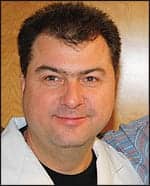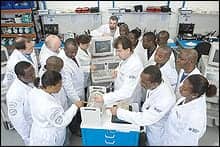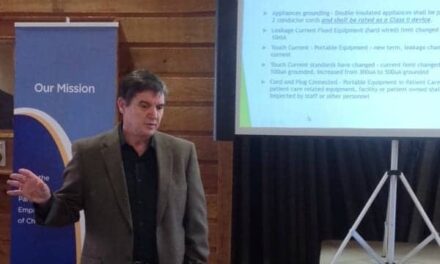
Costel Rizescu, PhD
In 2005, as a volunteer at MediSend International, I helped develop a new state-of-the-art biomedical repair laboratory to refurbish and redeploy donated medical equipment to developing country hospitals. Later that year, Nick Hallack, president and CEO of MediSend, invited me to join the organization. In 2006, we developed a unique biomedical repair training curriculum designed to respond to a severe lack of skilled biomedical repair technicians in developing countries. In early 2007, through the generosity of ExxonMobil, we launched a pilot program with students from four African countries.
Since 2007, we have graduated more than 50 trainees from sub-Saharan countries such as Nigeria, Equatorial Guinea, Chad, the Democratic Republic of Congo, Angola, and Liberia, as well as Kazakhstan and India. Many of our graduates are the countries’ first biomedical repair technicians trained to US BMET standards.
The MediSend Biomedical Equipment Repair Training Program empowers indigenous people to become equal partners in the development of their communities through specialized education and training—ultimately creating jobs, strengthening their economies, and improving overall health care. The 6-month intensive, outcome-oriented curriculum is centered on biomedical equipment repair and integrates courses featuring six scientific disciplines and more than 30 biomedical instrumentation technologies. With a curriculum of more than 600 hours of hands-on practical experience in installing, utilizing, and repairing medical equipment, the program has been tailored to provide education and competency covering approximately 80% of the medical instrumentation found in a typical developing country hospital.

Trainees and instructors in MediSend’s biomedical repair training laboratory.
The trainees are first reintroduced to basic disciplines along with the fundamentals of troubleshooting, biomedical instrumentation, and sensors. They are then instructed in the practical operation, repair, and calibration of modern medical equipment as well as professional and ethical conduct through courses in management and leadership. The students also learn how to use and maintain a hospital equipment maintenance program using modern information technologies.
As part of the program, Philips Healthcare provides professional instructors and certified training courses on Philips equipment used in the MediSend training laboratory. The trainees also experience a professional internship in several Baylor Health Care System hospitals. The internship allows them to work with experienced biomedical technicians and to employ their newly acquired skills in a hands-on, clinical environment.
Each trainee’s partnering hospital receives the MediSend Biomedical Equipment Test and Repair Kit, one of the largest and most comprehensive mobile units of its kind, containing over 4,000 laboratory repair tools, consumables, and supply items, as well as state-of-the art test and simulation equipment including DMM, ESA, DPM, tachometer, ECG-NIBP-IBP-Temp–SpO2, and defibrillator simulators. All electronic devices are outfitted with the proper plugs and power configuration for the country’s specific electrical system.
Lastly, each partnering hospital receives access to AIMS.NET, a Web-based software that enables the hospital to store and retrieve information about the hospital’s medical equipment, develop work orders, and generate reports as part of a fully functional equipment maintenance program.
Once in their hospitals, graduates are provided with technical assistance, consulting, and technical literature. Through a partnership with AAMI, we are able to deliver national standards and recommended policies and practices for medical devices. We also help the graduates set up preventive maintenance programs via telephone and online communications.
The demand for our training program has continuously grown. Developing countries are approaching us to help them develop state or national training centers and biomedical repair laboratories. One obstacle is that we simply do not have the human resources to meet this demand. We are always in search of talented biomedical technicians and engineers wanting to work in a performance-driven environment and interested in “on-the-job-training” to become instructors.
Working with MediSend is an extraordinary opportunity to help train students with cultural differences and with unique life experiences and knowledge to become biomedical technicians with the skills to install, maintain, and repair vital biomedical equipment. At MediSend, these individuals go through a life-changing experience and return to their countries to become future leaders and MediSend ambassadors with the capabilities to help transform health care in their communities. To learn more about MediSend and how you can help, see the sidebar above or visit our Web site at www.medisend.org.

Costel Rizescu, PhD, foreground, with MediSend instructors and trainees. |

Costel Rizescu, PhD, director of the MediSend Biomedical Repair Training Program. |

MediSend Biomedical Repair Training Program Instructor Trevor Johnson (Left), with Assem Bismildina, a trainee from Kazakhstan. |
Costel Rizescu, PhD, is professor/director of the MediSend Biomedical Repair Training Program at MediSend International, Dallas. For more information, contact .
What’s on Your Mind?Got a gripe? A recommendation? Does someone or something deserve praise? Share your opinions and insights with your peers. Soapbox columns should be 850 to 900 words in length and can be e-mailed to . |





